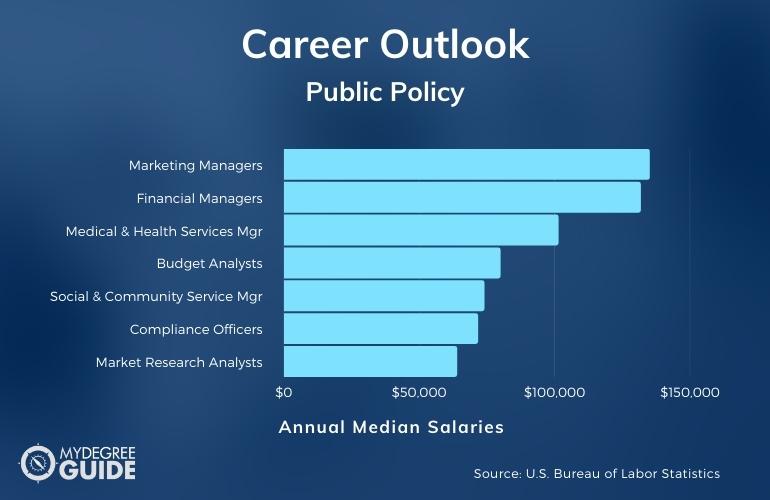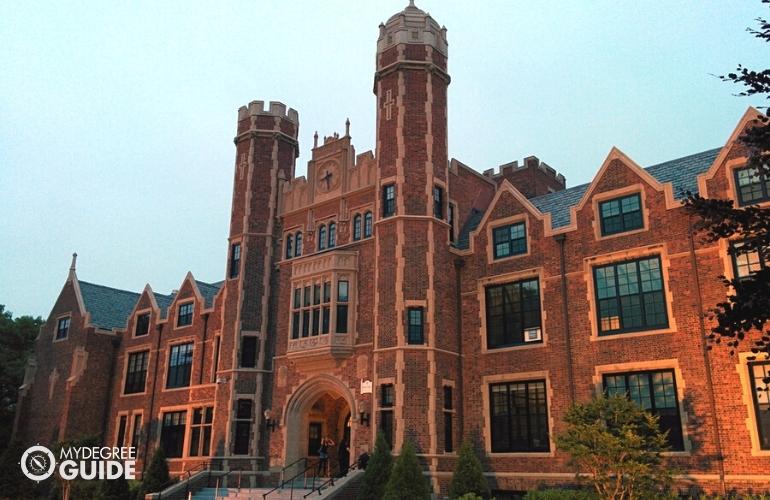A public policy degree exposes you to the body of laws and regulations that are adopted by both local and state governments.

Public policy officials may draft laws and study their outcomes on a population, or they may lobby for change. A bachelors in public policy could be a strategic choice for people who want a relatively versatile degree and consider themselves to be problem solvers and skilled communicators.
Editorial Listing ShortCode:
Read on to see if a major in public policy is right for you.
Universities Offering Online Bachelors in Public Policy Degree Programs
Methodology: The following school list is in alphabetical order. To be included, a college or university must be regionally accredited and offer degree programs online or in a hybrid format.
Arizona State University
Arizona State University offers a BS in Public Service and Public Policy. The online program requires the completion of 40 courses for a total of 120 credit hours. Each class is 7.5 weeks long.
The school aims to provide online students with the same quality education and degrees as their on-campus peers. Students must complete a senior capstone project to graduate. The curriculum consists of courses like Contemporary Policy Challenges.
Arizona State University is accredited by the Higher Learning Commission of the North Central Association of Colleges and Schools.
Florida International University
Students at Florida International University can earn a Bachelor’s in Public Policy and Service. The program has start dates in fall, spring, and summer semesters. To graduate, students must complete 120 credit hours, 60 of which must be taken in public policy. Students are allowed 12 credit hours in concentration electives and 24 hours in general electives.
Florida International University is accredited by the Commission on Colleges of the Southern Association of Colleges and Schools.
Liberty University
Liberty University offers a BS in Law and Policy—Public Policy. The program aims to prepare students for government and private work. The curriculum is designed from a biblical worldview. The BS requires the completion of 120 credit hours, which can potentially be done in just 3.5 years. All courses are entirely online and are offered in an 8 week accelerated format.
Liberty University is accredited by the Southern Association of Colleges and Schools Commission on Colleges.
Oregon State University
U.S. News & World Report named Oregon State University among the best online programs for bachelor’s degrees. OSU students can earn a BS in Public Policy through the school’s Ecampus. The program requires the completion of 180 credit hours and is delivered fully online. Students can choose from four start dates each year. Specializations offered include Environmental Policy.
Oregon State University is accredited by the Northwest Commission on Colleges and Universities.
Purdue University
Purdue University offers an online program for a BS in Environmental Policy and Management. The degree requires the completion of 180 credits, which can typically be done in 4 years when taking courses full-time. Each course is 10 weeks long, and the program offers multiple start dates. Students may participate in an optional internship and may begin taking master’s coursework in the BS program.
Purdue University is accredited by the Higher Learning Commission.
University of Arizona
U.S. News & World Report named the University of Arizona the #7 online bachelor’s degree program in the US. Students at the University of Arizona can earn a BS in Public Management and Policy online. The program requires the completion of 130 credit hours. There are six start dates offered throughout the year, and each course is 7.5 weeks long. The curriculum consists of courses like American National Government.
The University of Arizona is accredited by the Higher Learning Commission.
University of Missouri – St. Louis
The University of Missouri—St. Louis offers a BS in Public Policy and Administration. The program is entirely online, but students do have internship opportunities. Students in the program must complete at least 33 credit hours in political science. Students may choose from one of three concentrations: Public Administration, Nonprofit Management, or Public Policy.
The University of Missouri-St. Louis is accredited by the Higher Learning Commission.
University of Tennesee – Knoxville
The University of Tennessee—Knoxville offers a BA in Interdisciplinary Programs with an emphasis in Public Policy and Administration. The program requires the completion of 120 credit hours. Courses are offered entirely online and are asynchronous. Terms start in the fall, spring, and summer. Potential courses include Sources of Political Change in the Global South: Coups, Climate, and Conflict.
The University of Tennessee – Knoxville is accredited by the Southern Association of Colleges and Schools Commission on Colleges.
Utica University
Utica University offers a BS in Criminal Justice with a specialization in Public Policy and Leadership. The program requires the completion of 120 credit hours, which can typically be done in 4 years. There are six start dates offered each year to accommodate students’ busy schedules. Students must complete a senior project or internship to graduate.
Utica University is accredited by the Middle States Commission on Higher Education.
Wilmington University
Wilmington University offers a BS in Law, Policy, and Political Science. Students must choose one of three concentrations: Legal Studies, Government and Public Policy, or Political Science. The program requires the completion of 120 credit hours. Classes begin every 8 weeks. Students may also take dual credits to begin their master’s degree. Courses are offered online but require practical coursework.
Wilmington University is accredited by the Middle States Commission on Higher Education.
Online Bachelor in Public Policy Degrees

The goal of a public policy program’s curriculum is to make students proficient in forming public policy. A bachelor degree in public policy teaches you how to use analytical tools to fuse administration, economics, and law with public policy.
To help make students proficient in forming public policy, the curriculum has students study the tools and principles of political science and economics. That being said, public policy also requires a broader knowledge to perform various tasks while in the field.
So, students are required to study subjects that are common across many degree programs. These subjects include psychology, neuroscience, humanities, and data analysis. A public policy degree is a relatively versatile degree since many of the skills you learn are usually transferrable to various fields. That being said, some of the fields that public policy graduates often pursue include:
- Law
- Law enforcement
- Business and finance
- Lobbying
- Policy analysis
- Advocacy
The type of field you choose to enter may depend in part on your interests and degree specialization. Some common job paths for public policy graduates include:
- Market research analyst
- Public policy associate
- Budget analyst
- Legislative aide
- Regulatory affairs specialists
A public policy degree program exposes students to a variety of subjects. While the subjects can vary depending on the school you attend, here are some topics you’ll likely study if you pursue a public policy degree:
- Public speaking
- Writing
- Statistics
- Public policy creation
Public policy curriculum is designed to make you an efficient leader who can implement quality policies or policy reform. These skills are in-demand and will always be essential for a fully functioning society.
Public Policy Careers & Salaries

Earning a bachelor degree in public policy can lead to many different career opportunities. Your area of interest may help direct your studies and career direction. For instance, you can often choose a degree specialization or elective courses that fit with your preferred area of study.
According to the Bureau of Labor Statistics, here are the median salaries of some of the career paths associated with the field of public policy.
| Careers | Annual Median Salaries |
| Marketing Managers | $135,030 |
| Financial Managers | $131,710 |
| Medical and Health Services Managers | $101,340 |
| Budget Analysts | $79,940 |
| Social and Community Service Managers | $74,000 |
| Compliance Officers | $71,650 |
| Market Research Analysts | $63,920 |
| Public Relations Specialists | $62,800 |
| Social Science Research Assistants | $49,720 |
| News Analysts, Reporters, and Journalists | $48,370 |
Having a bachelor degree in public policy doesn’t guarantee you any specific job or salary, but it can help you develop qualifications and versatile skill sets for the field.
The type of positions you qualify for may depend on a number of factors, such as your degree specialization and your level of experience. Those who want to become policy analysts or political scientists go on to earn their on-campus or online masters in public policy.
Public Policy Bachelor’s Curriculum & Courses

Pursuing a bachelor degree in public policy can expose you to numerous courses across varied subjects. Below is a list of example courses you may come across in your curriculum:
- Analytic Foundations for Public Policy: This course exposes you to the tools, models, and concepts of public policymaking.
- Social Justice Issues in Public Policy: You’ll learn about the theories and advocacy strategies that promote policy reform.
- Statistics for Public Policy: You’ll learn how to use tools for evaluating and producing quantitative research for public policy.
- American Politics: You’ll be exposed to the United States political institutions, their functions, and their strengths and weaknesses.
- Public Speaking: This course helps improve your oral communication skills.
- Introduction to Psychology: This course introduces you to the framework of psychology, including a basic understanding of oneself and others.
- State and Local Government: This course introduces you to the processes, policy outputs, and structures of both state and local governments.
- Introduction to Political Theory: You’ll learn how political processes determine who gets what and when in society.
- Public Administration: This course teaches you about the theories and practices of governmental administration.
- Public Policy Analysis: You’ll learn about how the American federal government determines public policy.
The above list may give you an idea of courses you could take, but the specific coursework will vary by school and program.
Admissions Requirements

The admissions requirements for a bachelor degree in public policy can vary from school to school, but here are some general requirements you may encounter:
- Minimum GPA requirement of 2.0 or 3.0, on average
- SAT or ACT scores (if required)
- High school diploma and transcripts
Requirements can vary by school, especially when it comes to GPA and standardized testing requirements. It’s important to research your prospective schools before applying to make sure you fulfill and submit your school’s specific criteria.
Accreditation

If you’re going to school to become a public policy major, then you may want to consider researching regionally accredited universities. Accreditation is the process by which a university is reviewed by an accrediting agency.
Regional accrediting agencies must be formally recognized by the Council for Higher Education Accreditation (CHEA). If a university becomes accredited by an agency, then they, too, would’ve passed CHEA’s high standard of education.
Becoming an accredited university means passing a series of exams that testify to this high standard. The benefits of attending an accredited university include receiving a quality education while potentially making yourself more marketable to employers.
Public Policy Licensure and Certifications

Pursuing licensure and certifications after earning a public policy degree can be a strategic way to increase your knowledge or leadership skills.
Below are a few certifications that professionals in the field of public policy may pursue:
- Certified Business Analysis Professional: This is a business certification that demonstrates your ability as an effective business analysis professional.
- Certified Government Financial Manager: This certification is a testament to an individual’s knowledge of governmental budgeting, internal controls, and financial reporting.
- ICMA Credentialed Manager: This certification attests to the holder’s education, experience, standard of integrity, and commitment to learning.
While these are beneficial for improving and demonstrating your knowledge of the field, certification is not currently required to have a career in public policy.
Financial Aid and Scholarships

If you’re concerned about your ability to finance your education, there are a variety of financial aid options that you may explore, each with its own qualifications and features.
The primary form of financial aid for many students is federal aid, which may include student loans, grants, or work-study programs. You can apply by filling out the Free Application for Federal Student Aid (FAFSA). The FAFSA requires you to submit your or your family’s financial information to determine your eligibility for need-based aid.
Many students also pursue scholarships. Each scholarship program tends to have its own qualifications and application process. You can also check with your school to see what financial aid options they offer.
What Is a Public Policy Major?

A public policy major is designed to teach students to implement, develop, and evaluate policy solutions tailored to the challenges society faces. The curriculum may prepare graduates to deal with issues like national debt by using critical thinking to implement solutions.
Students typically take courses in political science, economics, and philosophy in order to build a foundation in public policy. Generally speaking, a public policy program is aimed at students who have a desire to make a change in society.
Is Public Policy a Good Major?

Yes, public policy is a good major for many undergraduate students. A public policy degree offers many benefits, and the skills you learn are applicable across different industries. This major is often pursued by people who are passionate about politics and community or societal change.
Some students wonder what you can do with a masters in public policy. While becoming a policy analyst typically requires a masters, there are a range of positions in government, business, law, and community service that public policy majors may pursue. Two common career paths for public policy graduates are market research analyst and social or community service manager.
According to the Bureau of Labor Statistics, these positions tend to have higher than average salaries. For instance, the median salary for market research analysts is $63,920.
Who Should Enroll in a Bachelors Degree in Public Policy?
Generally, a degree in public policy is often fitting for people who possess skills and traits similar to the following:
- Independent thinker
- Open-minded
- Organizational skills
- Critical thinking skills
- Teamwork skills
- Creative
- Passion for politics and societal issues
Of course, there’s no need to be discouraged if you lack some of these skills and are considering enrolling in a public policy program. It could simply be helpful to possess a few of these traits and have a willingness to develop the rest in your studies.
What Can You Do with a Public Policy Degree?

A public policy degree is a strategic choice for people who want to be both marketable and in-demand. According to the Bureau of Labor Statistics, these graduates typically go into a variety of fields, including law, community and social service, business, and finance.
A bachelor’s degree in public policy can open many doors for graduates, depending on their individual goals. Graduates may go on to become budget analysts, regulatory affairs specialists or managers, social science research assistants, market research analysts, or public policy associates. Some pursue work in community service management or city management.
How Long Does It Take to Get an Online Degree in Public Policy?

Public policy bachelor’s degree programs typically consist of 120 credits. Traditional semesters last 16 weeks, and if you choose to attend full-time, then you can generally complete a bachelors in 4 years.
If you choose to study year-round, then you may be able to complete your program in less time. On the other hand, if you’re a part-time student, then your program may take longer to finish. Your time to completion can also vary if you pursue an online bachelors degree in public policy program. Some online program offer accelerated tracks, but they may also offer greater flexibility.
What’s the Difference Between a Public Administration vs. Public Policy Bachelor’s Degree?
Differentiating between a public administration degree and a public policy degree can be confusing at times. The table below may help clarify the important differences between the two.
| Public Administration | Public Policy |
|
|
Understanding these differences can help guide you in your academic journey.
What’s the Difference Between an Online Bachelor’s Degree in Public Policy vs. Political Science?
Public policy and political science programs overlap in their curriculum, but there are important differences.
| Public Policy | Political Science |
|
|
It’s beneficial to do your research before choosing a major to ensure that the program you choose best fits your goals.
Is a Bachelor’s in Public Policy Degree Worth It?

Yes, a bachelor’s in public policy degree is worth it for many students. The public policy field is quite broad, and there’s a wide range of positions that public policy majors may pursue. Plus, a number of these career paths are experiencing faster than average job growth.
For example, the Bureau of Labor Statistics projects 19% job growth for market research analysts and 12% job growth for social and community service managers over the next ten years.
Getting Your Public Policy Degree Online

Pursuing higher education can allow you to increase your education and improve your career prospects. A public policy program is especially beneficial for those who want to make a change in society.
Public policy is a wide sector, and a bachelors in this field can act as a foundation for graduate studies or help you directly enter the workforce. In an online public policy degree program, you can develop versatile skills that can transfer to a range of industries. Some graduates pursue market research, law, business, finance, city management, or community service.
You can begin researching accredited schools to find the online public policy program that’s right for you.
